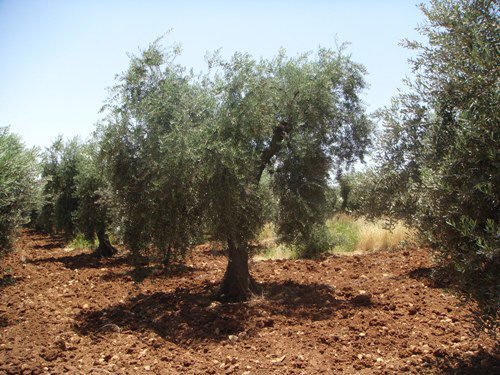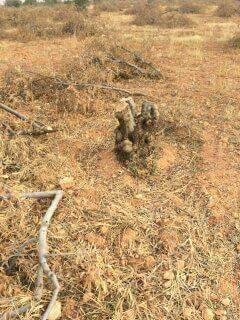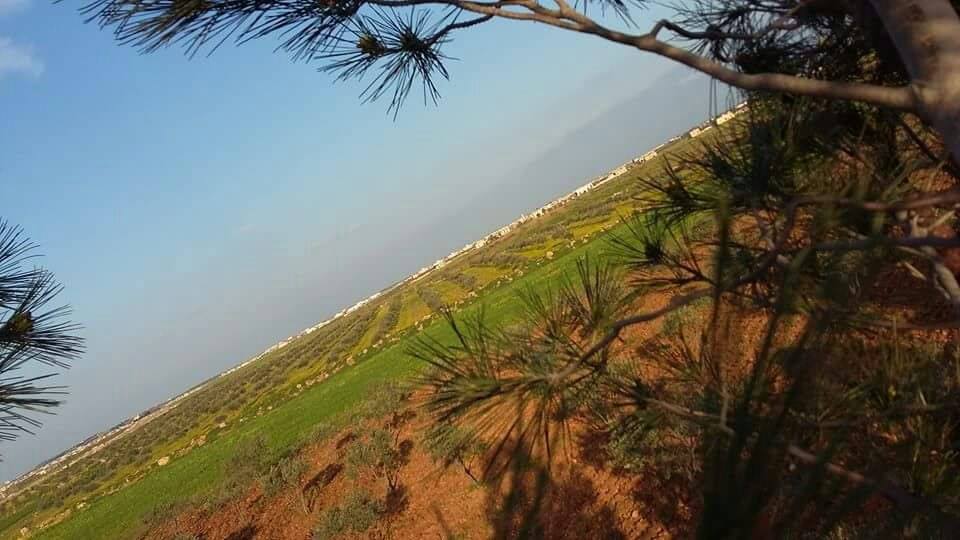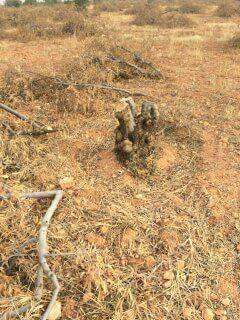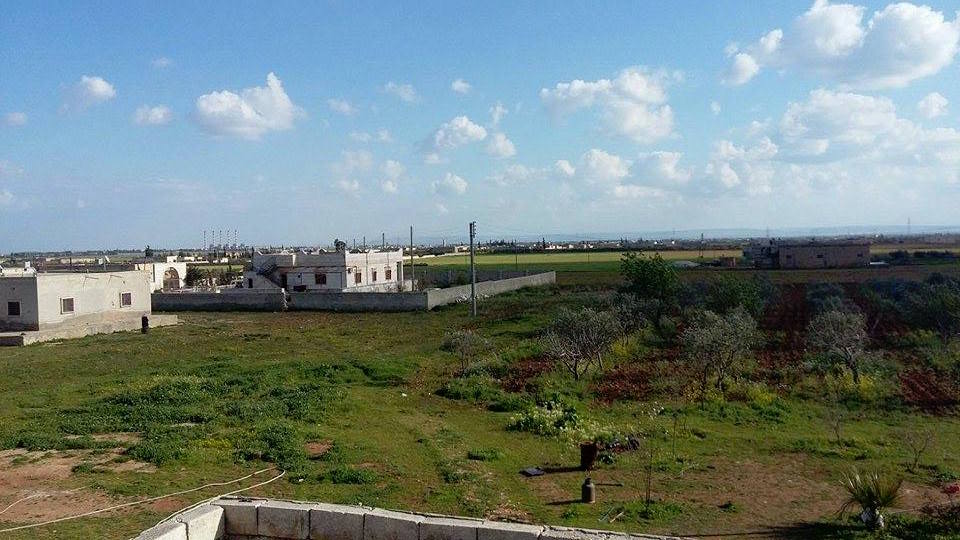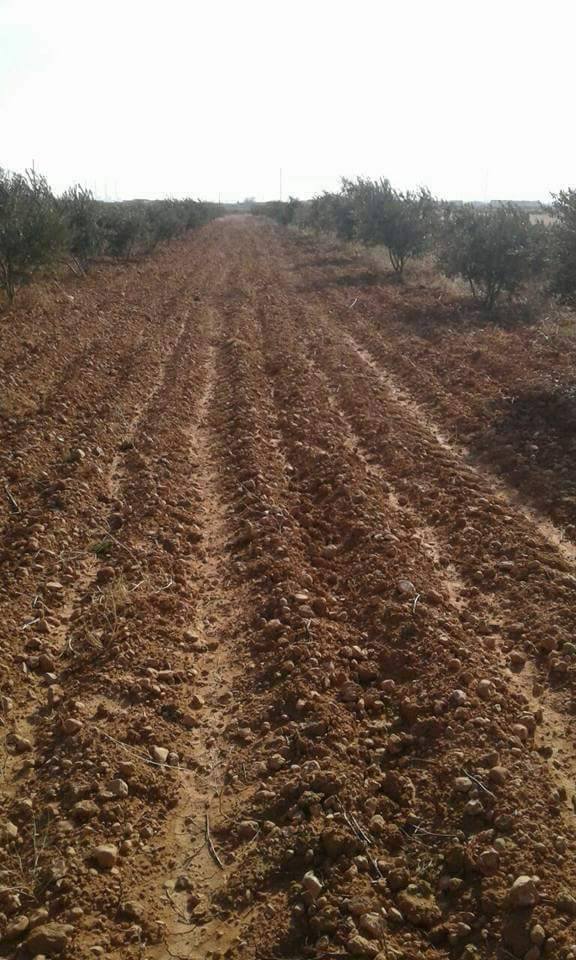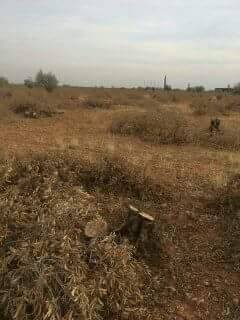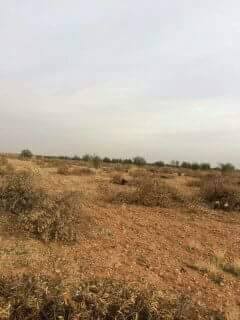The olive tree is the most important symbol of life and peace in the Middle East. It has been so central to daily life for thousands of years that it has a symbolic and practical weight beyond all other trees. It is mentioned in the Koran, the Bible and the Torah and its myth of origin is shared among the faiths. Adam’s son, born after his parents were expelled from the Garden of Eden, was allowed back to retrieve three seeds from the Tree of Knowledge. From these seeds grew the olive, the cypress and the cedar.
Research by the French Centre National de la Recherche Scientifique suggests that wild olive trees were domesticated and their fruits transformed into the larger, less bitter olives we know today around 8000 years ago in an area where now Syria and Turkey share their border.[1] Aleppo and its surrounding countryside was built on the back of the olive, which provided essential nutrition, a base for such products as soap and was a key source of revenue.
The fact that the area around Aleppo is the place of origin of the domesticated olive adds poignancy to what has emerged as yet another example of the heavy price Syrian civilians have paid in this war. The looting of olive orchards and the sale of wood of sometimes ancient trees has become commonplace outside the city. Theft has been part of the war from the start with abandoned houses often ransacked and stripped of all belongings. The Shabiha, the deeply violent and unfettered government militias that have done much of the fighting in the area, have become notorious among farmers in the northeastern Aleppo countryside for cutting down olive and pistachio orchards. It can take these trees decades to mature; a single blow of an axe represents a generation of loss. Not only can government militias make money selling the wood but they destroy the economic prospects of communities, forcing the remaining residents to flee. Assad’s plan to expel his enemies does not rely on barrel bombs alone.
A.H. is a refugee from the area now living in Germany. He shared his story:
Summer always has a very special place in my memory. I used to spend the whole season in the beautiful northeastern countryside of Aleppo. These were the best times in my life because I spent it on our land, among its trees and with my family. These trees were the source of our winter food stocks, which we would get together before we left at the end of the season. As summer was the best season for us, winter was the best season for the trees because it was the season that would give life back to them and water them with enough energy to be productive again the next year.
After the war, winter has become a nightmare for the trees and for their owners. After the regime stopped the supply of diesel and stopped the electricity to areas outside its control, some farmers were forced to cut their trees and use them for heating.[2] The same trees that were their sole source of living.
It did not stop there actually. I started seeing some videos and some articles talking about how the Syrian regime is targeting and burning some fields and olive farms to force the population there to evacuate their towns and villages.[3] These farms were not only providing food for people but also they were shelters for internally displaced people who ran away from the bombing of their homes only to face another bombardment in those olive tree farms. There is a Youtube video showing part of the destruction on an olive farm in al-Atareb in the northern countryside of Aleppo.
I got some news lately from my relatives who still live in our village (Jub Ghabsha) that some Shabiha members came to our village and started cutting trees to sell them as wood for heating. My cousin said that they cut up to 3000 olive trees in our village alone. This also pushed my people out of our village as they started to realize that their trees are going to be either burned, cut and looted or left to die without getting the proper care.
Some people might criticize us for being sad about trees given all the lives that have been wasted and the infrastructure that has been lost. Reconstruction might provide me with a house that I lost to regime missiles and rockets but it can’t bring back a tree that was 30 when it was cut down and used as firewood, a tree that provided me with my winter food and a lot of great summer memories.
Looting has always been part of war. It is a way to attract recruits, reward fighters and punish those who have stood up to you. The destruction of farmland of course also has a long history. Most recently the cutting of olive trees has been particularly controversial around illegal Jewish settlements in the Palestinian territories. Claiming that olive groves represent a risk to settlers because they could shelter snipers, Israeli forces have cut down B’TSelem, an Israeli human rights organization that has accused settlers of harassing and even shooting at Palestinians trying to tend their orchards.[4] Some 2.5 million trees, a third of them olive trees, have been uprooted in occupied areas since 1967.[5]
In 5th century BCE Greece at the time of the ruler Solon, Athens rewrote its constitution to protect olive trees. Such was the value put on them that the punishment for cutting one down was death. There is a case to be made that the massive destruction of the livelihoods of those in Syria represents a war crime. Article 8, Section 2a, No. IV states that “Extensive destruction and appropriation of property, not justified by military necessity and carried out unlawfully and wantonly,” is a war crime.[6] The penalties today may not be as harsh as in ancient Greece but the crime is as great.
Jub Ghabsha Credit to A.H.
[1] Catherine Marie Breton, Peter Warnock and André Jean Berville (2012). Origin and History of the Olive, Olive Germplasm – The Olive Cultivation, Table Olive and Olive Oil Industry in Italy, Dr. Innocenzo Muzzalupo (Ed.), InTech, DOI: 10.5772/51933. Available from: http://www.intechopen.com/books/olive-germplasm-the-olive-cultivation-table-olive-and-olive-oil-industry-in-italy/origin-and-history-of-the-olive
[2] علي الإبراهيم، أشجار سوريا في مقاومة البرد القارس تمدن الالكترونية، ٢٤\٠٢\٢٠١
Ali Al Ibrahim, Tamaddon News Website, 26/02/2016 goo.gl/dsWtDq
[3] نبيل طعمة، جريدة الأزمنة الالكترونية، الحطب مؤونة الشتاء ولصوص الليل يهربون الأحطاب إلى المناطق والقرى
للإتجار بها! والزيتون ضحية التدفئة، ٢٦\٠١\٢٠٠٦
Nabil Tu’me, Al Azminah News Website, 26/ 01/2016. http://www.alazmenah.com/new/?page=show_det&category_id=13&id=117590
عمران عزالدين، الأشجار التي أصبحت حطبا”، ألوان راديو اف ام، ٠١\٠٤\٢٠١٦
Umran Ezz Eddin, Alwan Radio FM, 01/04/2016
[4] Cesar Chelala. Palestinian Olive Trees: Destroying a Symbol of Life. Counterpunch. 3 November 2015.
[5] Relief Web.Fact Sheet: Olive Trees – More than Just a Tree for Palestinians. 21 November 2012. http://reliefweb.int/report/occupied-palestinian-territory/fact-sheet-olive-trees-–-more-just-tree-palestine
[6] The Rome Statute. http://legal.un.org/icc/statute/99_corr/cstatute.htm
 The Aleppo Project
The Aleppo Project